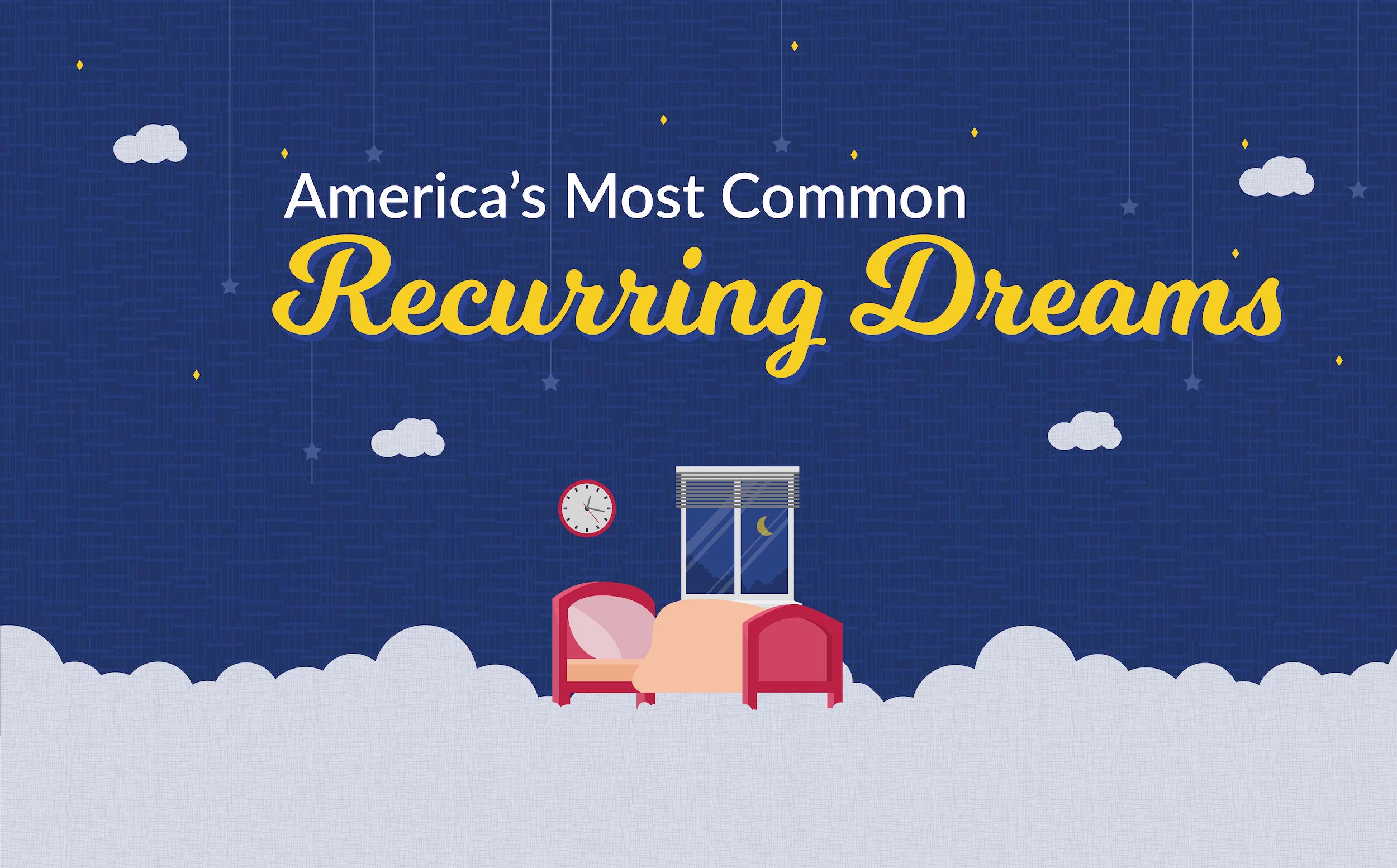Key Takeaways
- How Many People Work Late: Working late is a common practice among employees, with a majority reporting staying late at least half of each workweek. Despite the common perception that salaried employees work longer hours, both salaried and hourly workers reported similar frequencies of staying late at work.
- Why Work Late: Employees often make the choice to work late due to various reasons, such as career advancement or managing workload. However, a significant portion also reported feeling pressure from supervisors to work late, potentially risking their job security if they don’t comply.
- Drawbacks of Working Late: While putting in extra hours at work can lead to increased earnings, it often comes at the cost of sacrificing personal time, sleep, and healthy lifestyle habits. Long hours can affect both physical and emotional well-being, and it is crucial for individuals to find a balance between work and personal life to maintain overall health and well-being.
It’s after five p.m., and you’re trying to find a stopping point on a project your team has been struggling with for weeks. Several of your co-workers have walked briskly past your desk, juggling messenger and workout bags, treading lightly, trying to avoid the boss, eyes focused like a laser beam as they move toward one of the side exits where freedom awaits.
Almost everyone makes it; everyone but you as your manager appears out of nowhere to utter those dreaded words, “Hey, I need you to stay late and help out tonight. You didn’t have any plans, did you? Thanks so much,” before returning to his office. You never uttered a word.

Staying late, either voluntarily or involuntarily, sometimes has downsides, yet many people put in extra hours at work and believe the advantages outweigh the disadvantages, such as interrupting your sleep habits.
To gain a feel for how and why some people work late and the side effects associated with missing social or family time or even much-needed sleep, we took the pulse of 1,188 workers, of which 90 percent stayed at least 15 minutes longer at work.
Are you a part of the 75 percent of respondents who said they’ve had a job that asked too much of them? Hang around while we explore how to handle an overachieving boss or why others decide working late is the fastest path to the C-suite.
Burning the Midnight Oil
Most everyone has worked late at some point in his or her career. In fact, a majority of employees worked late at least half of each workweek.
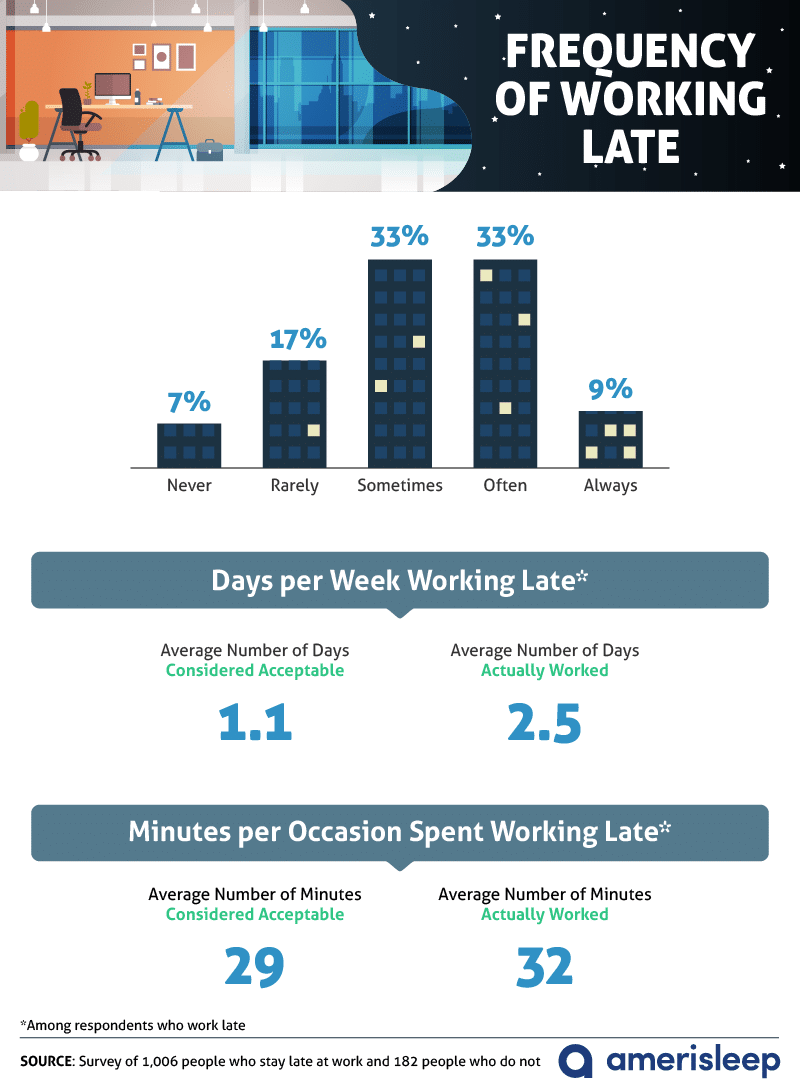
You may assume salaried employees work later much more often than those who work hourly; however, that’s a misconception. Both groups stayed late an average of two and a half days per week, averaging 40 minutes and 33 minutes, respectively.
Two-thirds of those surveyed reported they “sometimes” or “often” worked late, split evenly at 33 percent. Only 7 percent said they “never” worked extra hours, while 9 percent “always” stayed late.
This particular survey focuses on how often people worked late, including what they give up and a few other issues – but an Australian news story took a different approach, asking if leaving work on time is detrimental to a worker’s career.
The article suggested workers might stay later to demonstrate they care about their work or career. Others may work extra hours because they can’t get everything done in the typical eight-hour workday.
On the flip side, others make the case that adhering to an eight-hour workday not only makes them better employees but also shows they manage their time more effectively.
We touched on the fact that our respondents averaged two and a half days working late, but when asked what they felt was an acceptable number of days, the number fell to just over one day per week.
Most everyone has heard stories of young attorneys or resident physicians putting in 80-hour workweeks, but our respondents only averaged working an extra 32 minutes per occasion and expressed 29 minutes as an acceptable amount of extra time at work.
Wanting to Work Late vs. Having to Work Late
People usually feel better about choosing to do something versus being made to do something. Take mowing the lawn or making the bed each morning. If we perform such tasks because we believe a freshly cut lawn adds to a home’s curb appeal or how beautiful our bed looks when adorned with a fresh duvet cover and coordinating pillows, that’s one thing. Being told or made to do such a task is another story, and the same holds true for working extra hours.
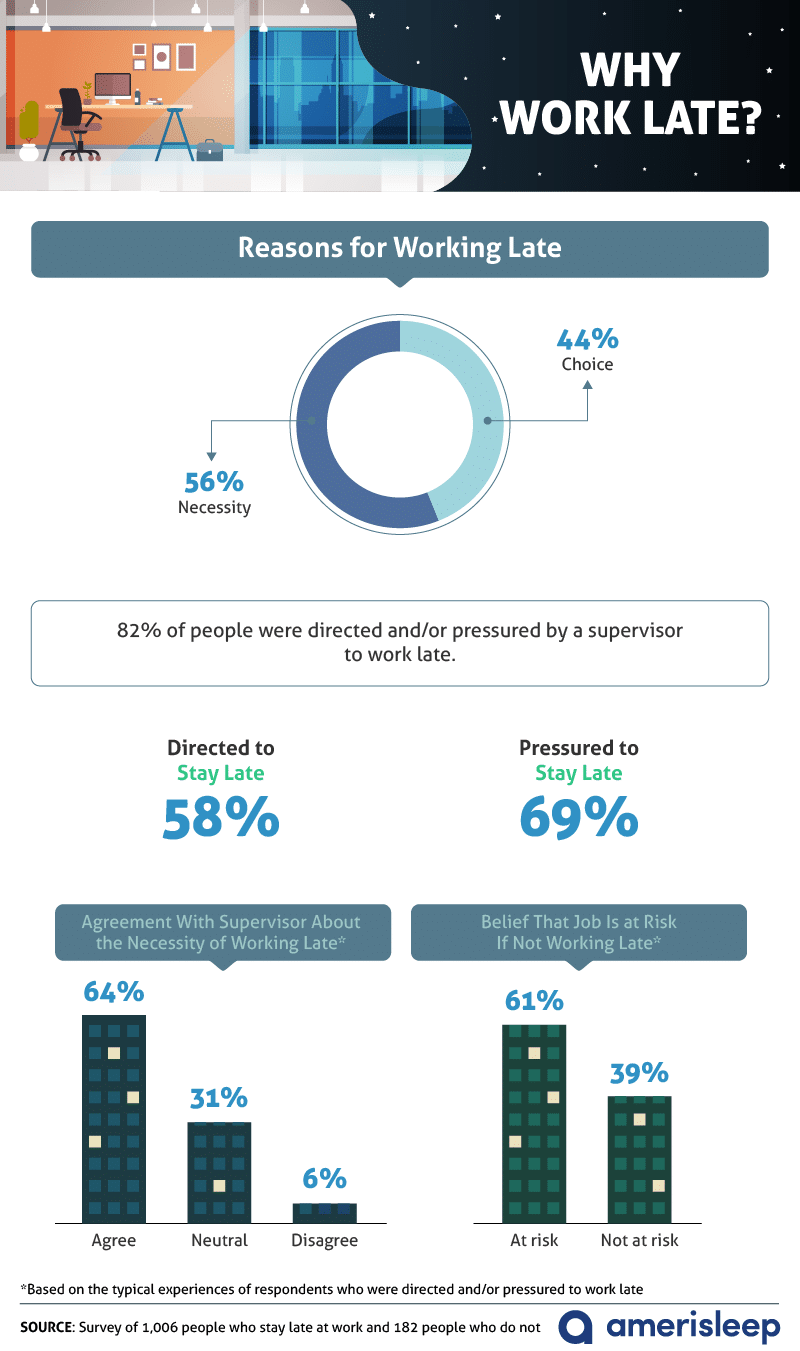
When asked their reason for working late, 56 percent said it was out of necessity, compared to 44 percent who said it was their choice. However, at one time or another, 82 percent of those surveyed said they were directed or felt pressure from a supervisor to work late.
Let’s say your boss asks you to stay late. Are you OK fulfilling their request, or do you do so begrudgingly? Close to two-thirds agreed with their supervisor that staying late was necessary. Just shy of one third were neutral about the request, while 6 percent disagreed with the boss’s directive.
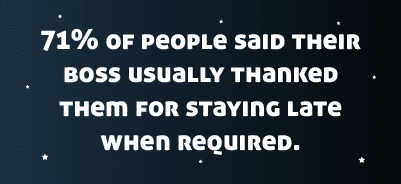
But whether workers agreed or disagreed with staying late at the boss’s suggestion, we wanted to know if they believed their position was in jeopardy if they didn’t comply. A majority of 61 percent stated such. Only 39 percent didn’t feel they would risk losing their job by not working late.
On the bright side, 71 percent of people said their supervisor recognized their extra effort by saying, “Thanks.”
Are Extra Work Hours Affecting Your Sleep?
Most medical professionals, including the Centers for Disease Control and Prevention (CDC), recommend adults between 18 and 60 years old average at least seven hours of sleep per day. Verified Source Centers for Disease Control and Prevention (CDC) The United States’ health protection agency that defends against dangers to health and safety. View source Yes, that’s almost one-third of our day, which equates to one-third of our lives. We were curious if working extra hours interfered with the amount of sleep our respondents received.
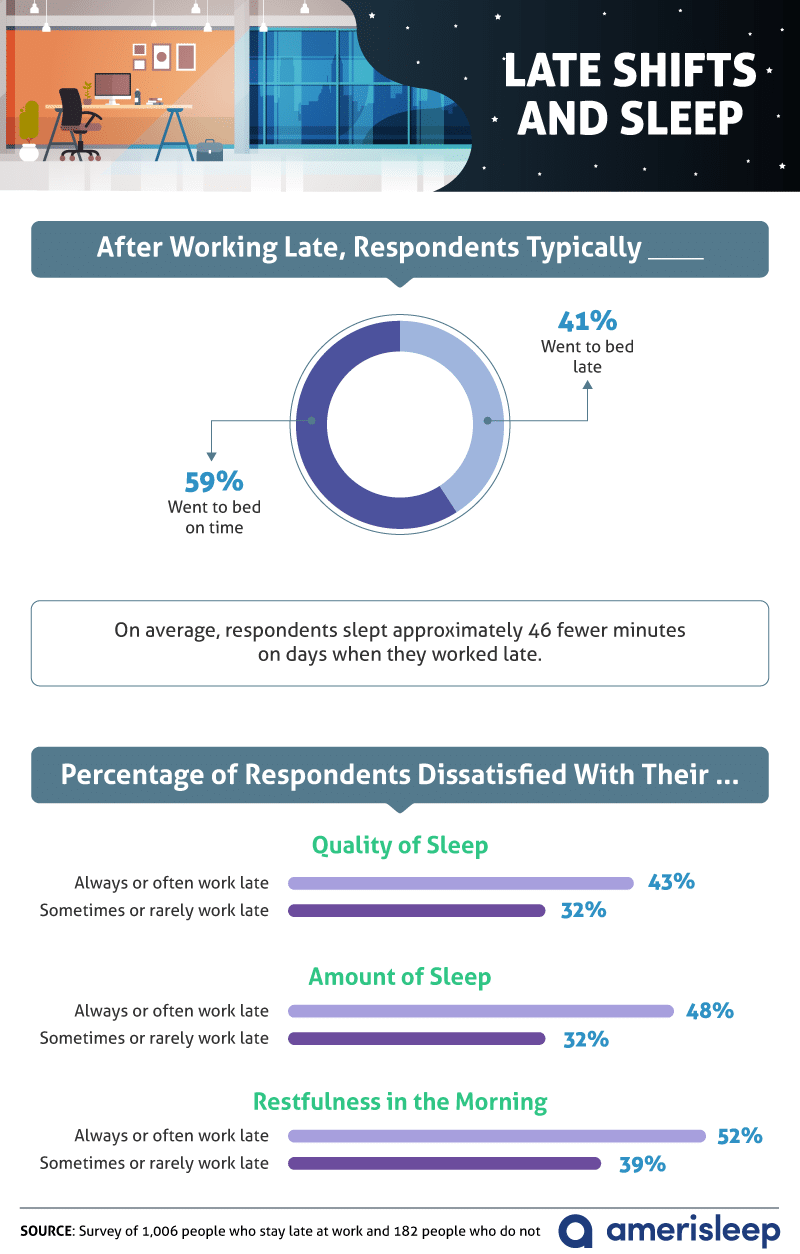
We discovered working late does, indeed, affect sleep. While the differences aren’t staggering, a pattern of lower sleep quality does exist between people who always or often work late.
Forty-six minutes may not sound like much, except that was the average amount of daily sleep lost when respondents worked late. Some may even try to catch a brief nap at work to prep for that lost time.
Putting in overtime at work didn’t seem to impact the usual bedtime for 59 percent of people, whereas 41 percent said their turn-in time was later than average on the days they worked longer.
While losing three-quarters of an hour now and then to advance your career may not sound like a lot, a 25-year-long study of Finnish businessmen Verified Source Oxford Academic Research journal published by Oxford University. View source determined middle-aged men who worked more than 50 hours while sleeping less than 47 hours per week suffered negative consequences and were less healthy in their older years.
Although we hear about the amount or quantity of sleep time, quality sleep is also essential.
Of those who always or often worked late, 43 percent expressed dissatisfaction with their quality of sleep, with 48 percent of the same group saying the amount of sleep they got wasn’t enough. It also doesn’t surprise us to see 52 percent of consistent overtime workers felt they were not as well-rested after burning late-night work oil.
Working Late is Worth It
Getting less sleep and sometimes sacrificing a restful night’s slumber is a price worth paying for most people who work late. Plus, employees who put in the extra time usually make more money.
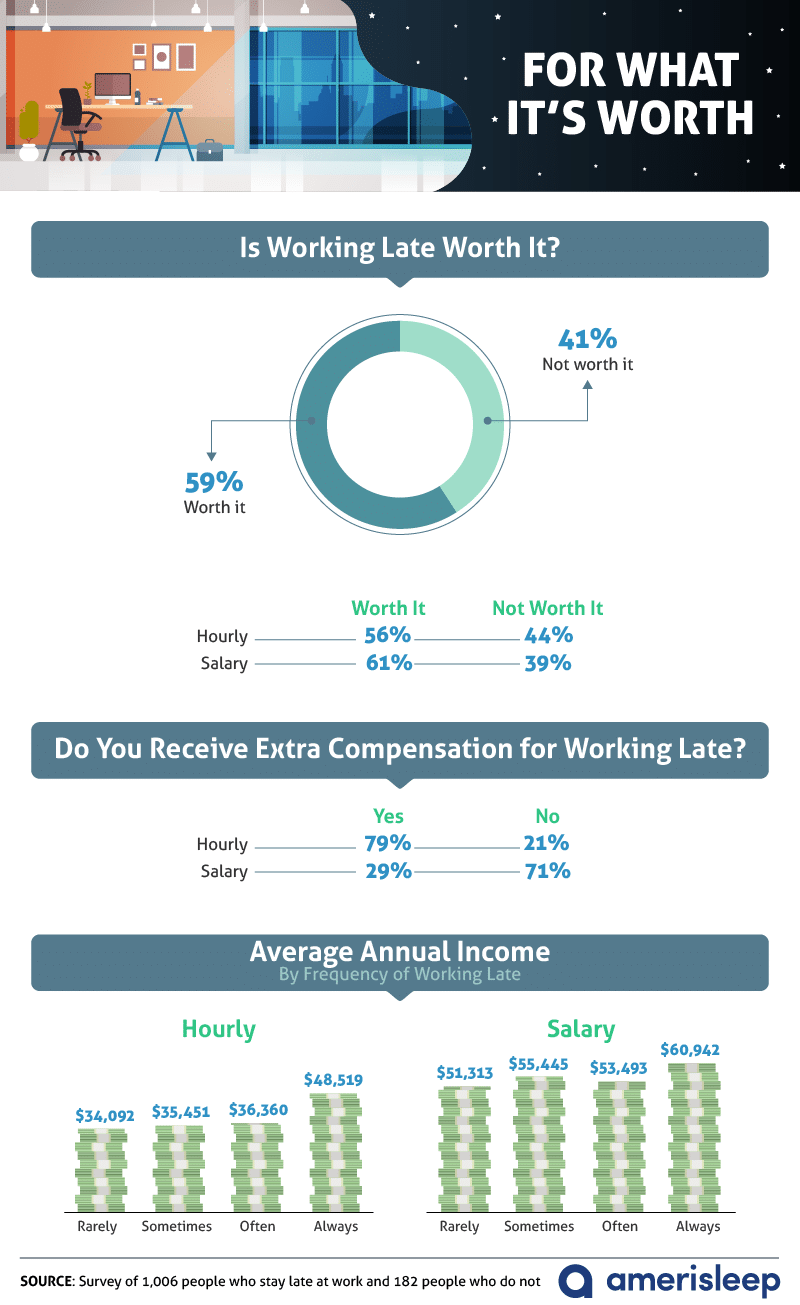
Whether salaried (exempt) or paid by the hour (non-exempt), both types of employees are sometimes asked to work late, and while some similarities may exist, there are a couple of differences in how they view overtime and whether they are compensated for their effort.
Salaried employees were five percentage points more likely to say staying late was worth it, even though a significant percentage of hourly employees received additional compensation for working extended hours. One reason is, in part, because of a labor act enacted in 1938.
The Fair Labor Standards Act (FLSA) establishes standards for minimum wage and overtime pay. One provision in this federal law that applies to hourly workers states non-exempt employees must be compensated time and a half for anything over 40 hours per week.
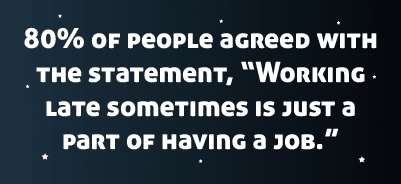
Exempt employees, defined as a worker earning more than $23,600 annually and paid a “minimum amount,” on a regular basis, usually aren’t compensated immediately for working extra hours. However, financial incentives like bonuses, commissions, or a pay raise most likely motivate salaried employees to put in extra time, compared to their hourly colleagues.
If you have questions about whether you qualify for extra pay, checking with your supervisor or human resources office is an excellent place to start.
Regardless of the compensation method, our survey shows hourly workers who always worked late earned over $14,000 more than hourly workers who rarely worked late.
The same was true for salaried employees because those who were always willing to work late pocketed over $9,600 more in pay compared to salaried workers who rarely worked overtime.
Paying the Price
Sometimes, when employees put in more time at work, they must sacrifice time with family or friends.
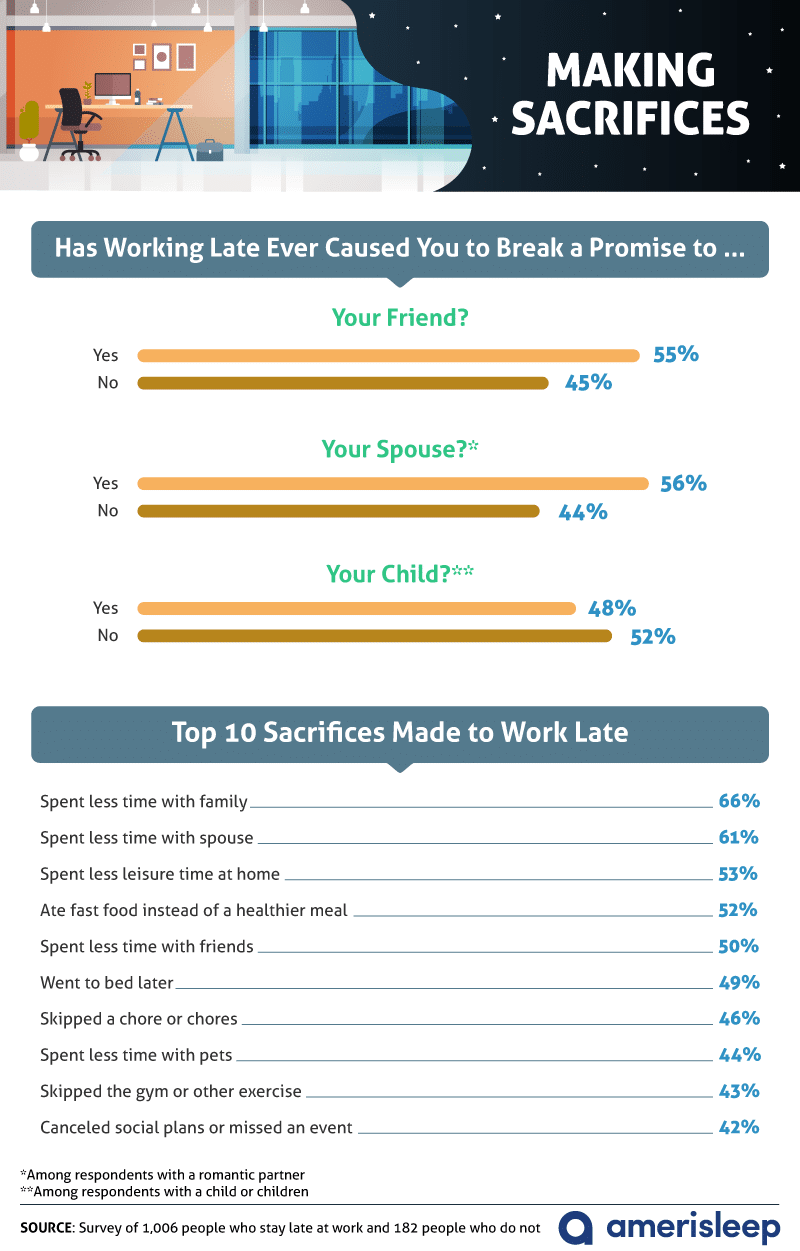
Spouses gave up the most when their partners worked late because 56 percent of respondents admitted to breaking a promise, with over 60 percent saying one of the sacrifices of working more was less time with their spouse and family.
Friends of hard-charging workers also paid the price because they too saw less of them, with over half having to adjust or cancel plans when a promise was broken.
Healthy lifestyle habits suffered setbacks as well. For example, eating fast food as opposed to enjoying healthier meals at home or even at restaurants, skipping the gym or exercise routines, and getting less sleep were common sacrifices.
One bright spot were children, since a slim majority of workers said working additional hours didn’t cause them to break a promise to their child.
Healthy Habits Decrease as Work Hours Increase
Staying late may fatten both your bank account and your waistline, as two-thirds of people reported eating a less healthy diet when working late. Not only can your physical health suffer, but also your mental and emotional well-being too.
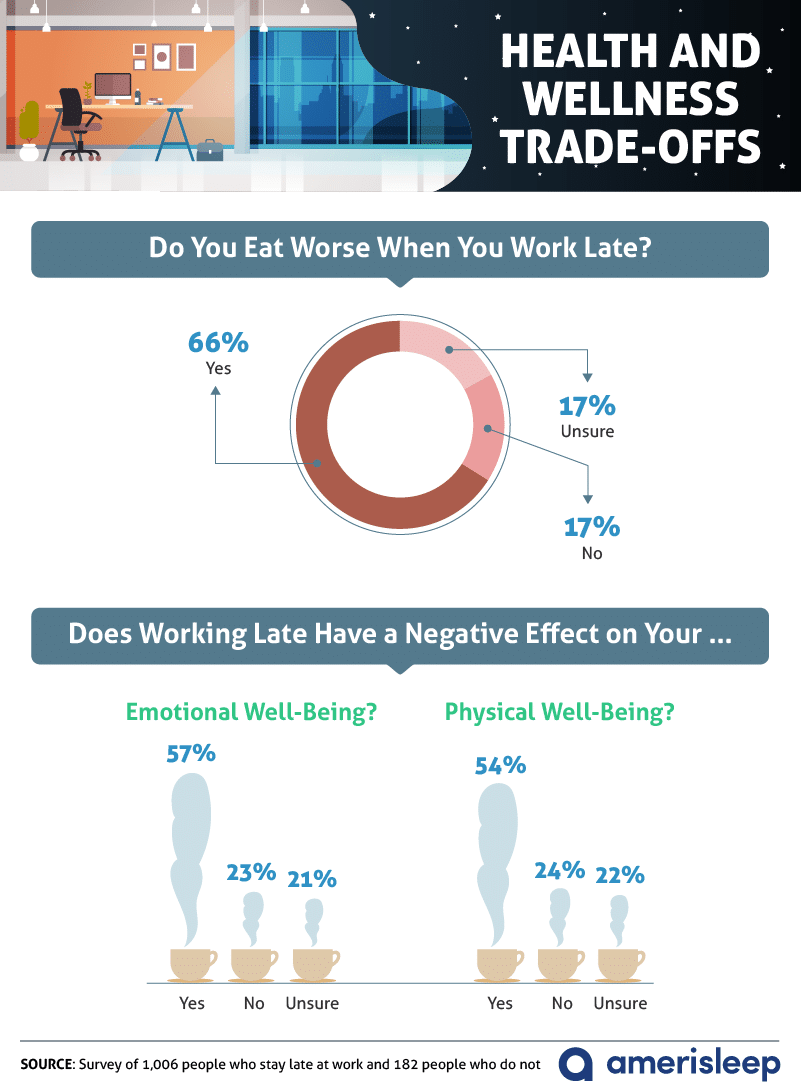
Figuring out the formulas and layout for the Excel spreadsheets that are so vital to keeping client projects on track may, indeed, get you a pat on the back from a superior. However, there may be a more significant price to pay when feelings of guilt come calling over missing your spouse’s family reunion.
Well over half of the respondents said working longer hours hurt their emotional well-being, and 54 percent said the same about their physical needs.
Mental health experts say overachievers tend to compartmentalize their work from other aspects of their life, mental health being one. Often, people become so engrossed in their work that their ambition turns from feeling productive to feeling overwhelmed, producing negative thoughts, and in turn, negative emotions.
When this happens, experts suggest you find a support base. It may be as simple as talking it over with a friend or co-worker who understands your plight, or when that’s not an option, to seek professional counseling. Often, mental health treatment, just like treatment for physical needs, is covered under company health insurance policies.
Working Overtime is OK, But Find Your Balance
Staying late at the office to complete projects or advance your career is OK for most employees. Not only do they achieve a sense of accomplishment, but also they demonstrate their worth as a valuable part of the team.
Nevertheless, finding the proper balance between work and home life is paramount, and that includes getting enough quality sleep to keep you sharp and energetic to meet the needs on all fronts. That’s why the hardworking employees at Amerisleep strive to do their part.
We’ll help you find the best mattress for your body and sleep position, and our innovative technology is designed to achieve one primary goal: to give your body and mind a peaceful and sound night’s sleep. To see our complete line of products, visit us online today.
Methodology and Limitations
We surveyed 1,188 people, 1,006 of who stayed at least 15 minutes late at work. To ensure we only included results from respondents who took our survey seriously, only individuals who passed an attention check were included in the data. Our respondents ranged in age from 18 to 79 with an average age of 36.
Some questions and answers have been condensed or rephrased for clarity. Not all percentages may add up to 100 percent; this is due either to rounding or to responses of “uncertain, neutral, and not applicable,” among others, not being included in the visualizations. These data are intended to be used for entertainment purposes only. These data rely on self-reporting, and no statistical testing has been performed on the findings. Potential issues with self-reported data include, but are not limited to, selective memory, telescoping, attribution, and exaggeration.
Fair Use Statement
Maybe you’re working hard to get this important information to your readers. As long as it’s for noncommercial purposes, we’re happy for you to share our results about the effects of putting in extra hours at work. Our only request is that you link back to this page so those who contributed can be credited.
Sources
- https://www.abc.net.au/life/is-leaving-work-on-time-bad-for-career/9934420
- https://www.cdc.gov/sleep/about_sleep/how_much_sleep.html Verified Source Centers for Disease Control and Prevention (CDC) The United States’ health protection agency that defends against dangers to health and safety. View source
- https://academic.oup.com/ageing/article/46/1/108/2605686 Verified Source Oxford Academic Research journal published by Oxford University. View source
- https://www.dol.gov/whd/flsa/index.html”>
About the author
McKenzie Hyde is a Certified Sleep Science Coach and a full-time writer specializing in sleep health and the mattress industry. With a Master of Arts degree in literature and writing from Utah State University, McKenzie combines her passion for writing with her in-depth knowledge of sleep science. Her articles cover a wide range of topics, including best sleep practices for students, the consequences of sleep deprivation, and choosing the right mattress for back pain relief. McKenzie's dedication to delivering accurate and informative content makes her a valuable contributor to the field of sleep health.
View all posts





